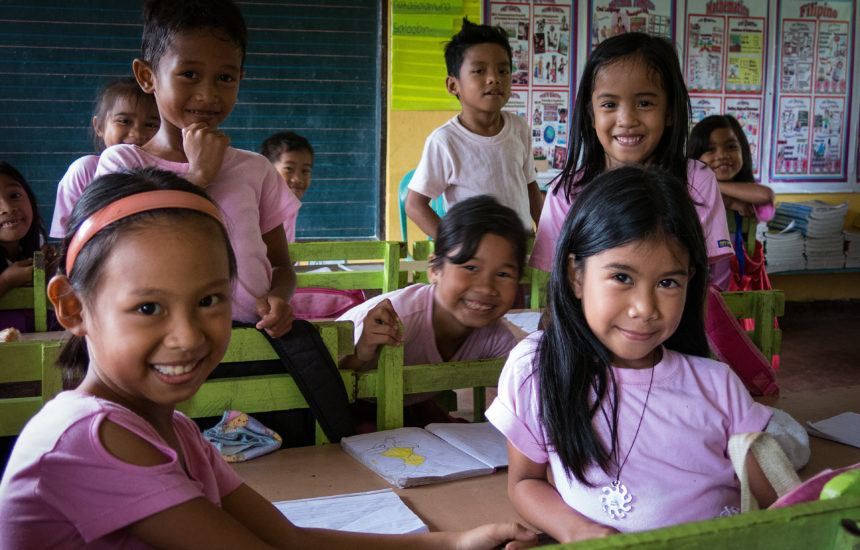Improving Access and Quality to Education in the Philippines


Country Liaison for the Philippines, Michelle Lalunio, orients us to the policy shifts that have been happening within the Philippine education system, including changes to the academic calendar and increased access to early childhood education and senior high school level. She also highlights initiatives in the Philippines to improve the quality of education for displaced children due to conflict and those living in remote provinces, aligning with the nation’s commitment to achieving the Sustainable Development Goals (SDGs). Michelle is a role model for lifelong learning herself, taking an online course to improve her intercultural competence.
Shifts in the Philippine School System
Over the last two years, Philippine schools have been delaying their start of classes to adapt to the Asian academic calendar. While Philippine schools had previously started school in June, some private schools, for example, are beginning classes in July or August. The Philippine school year usually lasts between 9 to 10 months.
Due to the calendar shifts, the Philippine Department of Education (DepEd) adjusted the allowable entry age of children enrolling in kindergarten and released an amendment known as the “Omnibus Policy on Kindergarten Education.”
The Senior High School Program in the Philippines was implemented in 2016 to align with its Southeast Asia neighbors to provide basic education from kindergarten to 12th grade. Previously, the Philippines had provided just 10 years of basic education to its population. Recognizing that older children may lose opportunities to contribute to the family income as they attend senior high school, thus placing a financial burden on families, the Department of Education introduced the “Senior High School (SHS) Voucher Program” to provide financial assistance for the enrollees.
Improving the Quality of Education During the SDG Era
The Philippine Department of Education has released a memo that called for the seamless acceptance and inclusion of displaced Marawi students into their new schools, despite the loss of student data from the Learning Information System (LIS) that occurred during the recent conflict and destruction that took place in the city of Marawi on Mindanao island. Promotion and movement between grade levels will be based upon their academic performance for this school year if their data in the LIS system had been destroyed.
To provide access to Information and Computer Technology literacy to remote provinces that lack electricity, the Department of Education, in partnership with the United Nations Development Program (UNDP), launched a solar and computerization project for the Baungis Elementary School in Basilan in the Autonomous Region of Muslim Mindanao (ARMM). As stated in the DepEd’s website:
“Raising the Filipino learners’ ICT literacy is expected to contribute to the delivery of quality and accessible education, one of the 17 Sustainable Development Goals (SDGs) committed by the Philippine government to the international community. DepEd and UNDP are working closely towards the realization of this goal through this computerization and solar power project.”
More schools associated with De La Salle Lipa have been aligning their plans according to the United Nation’s Sustainable Development Goals, specifically targeting social responsibility programs addressing specific SDG’s. De La Salle Lipa, the institution that Michelle Lalunio represents, has realigned the direction of the school toward answering and targeting specific SDGs per strategic direction.
Learning Without Walls – Growing Intercultural Competence
As an active Country Liaison, Michelle Lalunio completed an Intercultural Competence class that she feels will be beneficial for her Country Liaison role and position with De La Salle Lipa, as she works with people of various personalities, backgrounds, and cultural beliefs. This course, along with others she has attended, solidified the notion that learning need not be confined within the walls of a classroom.
According to Michelle, e-learning through free and paid online courses and programs has made learning more accessible. The course “Improve Your Intercultural Competence” was offered through www.futurelearn.com and has given Michelle a new sense of understanding and practical knowledge about adaptability in various cultures/situations.
For More Information
Official Website of the Department of Education, Philippines: www.deped.gov.ph
TEACHERPH Professional Learning Online Community of Teachers and for Teachers: www.teacherph.com
De La Salle Lipa: www.dlsl.edu.ph
Future Learn: www.futurelearn.com